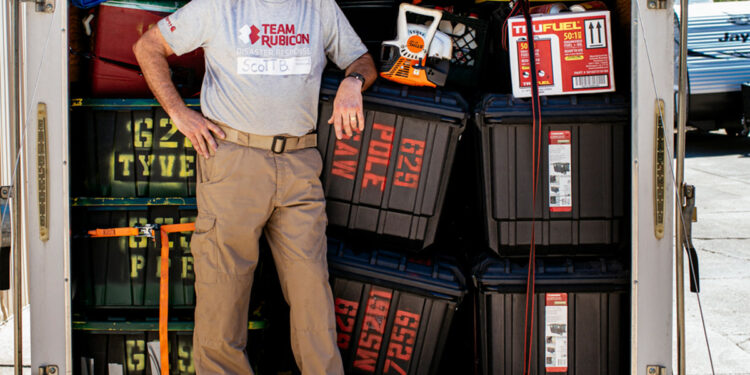Viewing fields that appear to be bombed and seeing houses with trees that have crashed right onto them is nothing new to Scott Brown. The former Army colonel served a total of 32 years in disaster areas and war zones, including being deployed for 2 1/2 years in Afghanistan.
“You get used to a chaotic experience,” Brown said. “To the extent that I miss some of that about Afghanistan.”
Brown retired in 2012 from Offutt Air Force Base, and within a couple of years, he was traveling—to a river search and rescue where he assisted first responders, and to a fire that ravaged a local business where he delivered drinks and snacks, among other places.
As a healthy middle-aged man, he could have gone into the civilian work force, made a separate pension, and retired in another 20 years. That isn’t Brown’s philosophy. He leaves the working world up to those in need of a job while toiling as hard, if not harder, than any 9-to-5 worker.
He first volunteered with the Salvation Army Emergency Disaster Services Team, performing the aforementioned jobs along with serving on the Night Watch and helping with other response efforts by driving a canteen truck.
It was while driving the canteen truck that he found a second group of volunteers with whom he could spend his time—and this group shared a common bond of service. He began talking to a group of onsite volunteers he was feeding in Omaha for a Habitat for Humanity event, and he noticed these volunteers were veterans. This intrigued him.
It helped that he knew at least one of the volunteers.
“It just happened [that] in North Omaha there is a Salvation Army in the midst of our rehab organizations,” said Mark Coffin, veterans outreach coordinator for Habitat for Humanity. He also volunteers with Team Rubicon, and he knew Brown as a fellow officer in Afghanistan. “We coordinated with that Salvation Army for Team Rubicon. Scott was a volunteer helping to feed [people]. He said ‘who are these people and what do they do?’”
Team Rubicon is a group of veterans who have found the sense of purpose and community they knew in the military through disaster recovery. They were helping Habitat for Humanity that day, gutting houses as a training exercise. Brown knew he wanted to join that team, and within a couple of months, he had trained as a “swamper,” hauling away branches from disaster sites.
He was destined for bigger things. Brown next trained to become a sawyer felling downed and damaged trees, and as a sawyer, he discovered a way to assist doing a job that he loves. He has taught other volunteers to saw down trees, from Kansas City to Texas, and has helped the team’s state administration.
“I like Scott,” said William “Bobby” Smith, Nebraska State Administrator of Team Rubicon. “He’s just a generally good guy. He doesn’t need attention. He just does it because he wants to. He has a drive to help others in need—plus he likes to use a chainsaw.”
When the call comes, Brown often says he can help. He’s cut down trees from an ice storm in Kansas and a tornado in Missouri; but seeing the devastation from a hurricane blew him away.
In the immediate aftermath of 2017’s Hurricane Maria, Team Rubicon provided medical services and debris removal. When they asked for volunteers that November, Brown packed a duffle bag and a sleeping bag, then boarded an airplane for an island 2,400 miles away from Omaha.
“The utter devastation was…wow,” Brown said. “A tornado is a lot of damage in a concentrated area. This was destruction over the entire island.”
The organization picked up the cost of the flight, along with food and housing for all the volunteers during their stay. Housing, however, was a loose term.
“We were in a place with no electricity or running water. The shelter had a leaky roof,” Brown said nonchalantly of his living conditions in Puerto Rico. “The electricity would come on intermittently. Sometimes someone would come through and say ‘hey, the water is working again.’ That’s when we could get a shower, otherwise we had a tanker truck we rinsed off with.”
The lack of electricity is why Brown appreciated a small gesture by a local family.
As he and his teammates went to a house to take down trees one day, they discovered the homeowners were not at the residence, and policy said the volunteers must wait until the homeowners returned so they could work.
“The neighbors brought us some chairs, and the next thing you know, they were bringing us cold drinks,” Brown said. “Where they got them, I have no idea.”
Brown also recalled a spiritual experience. One day, when the group was sawing trees at a park, they took a lunch break at a pavilion, and at a table nearby was a group holding a bible study. The bible study group came up to the volunteers and asked if they could pray for them.
“It was possibly the only English they knew,” said Brown, who attends Steadfast Bible Fellowship in Omaha with his wife.
Brown worked mainly with the trees, cutting down impaired arbors in order to prevent further damage to people or their homes. The critters living on the trees often wanted to stay where they were.
“The iguanas were fearless,” Brown said. “You’d be working on a tree trunk and they’d hang on until it fell over. You’d sit on a stump to rest for a moment, and it would be sitting there, watching you.”
Although Brown did not know it, he was an original part of the cleanup in Puerto Rico that has since started new initiatives, sending other teams to the area to provide roofs and, eventually, hiring contractors to rebuild homes. Brown’s part of clearing trees paved the way for 1,350 people to be placed back in their homes.
“That he wanted to serve his community instead of chasing a paycheck is admirable,” Coffin said. “Scott decided he wanted to do something different.”
Visit teamrubiconusa.org for more information.
This article was printed in the September 2020 edition of Omaha Magazine. To receive the magazine, click here to subscribe.













